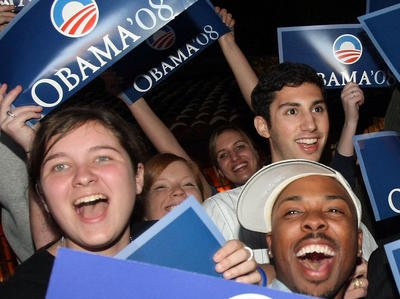
Barack Obama is not especially popular, and certainly not as popular as when he first became President in 2008. However, surveys consistently show him ahead in the polls and substantially ahead in the Electoral College vote, the only vote that counts in the end.
The economy is not improving. When Obama came into office, he himself claimed that if he couldn’t get unemployment down below eight percent and solve our other economic problems, he’d surely be a one-term President. Things have actually worsened, yet he’s poised to win a second term.
What in the world happened?
Consider a front-page article, back in 2007, in the Wall Street Journal entitled ‘Whites’ Great Hope?’ This article says as much about 2012 as it did back in 2007 and 2008. It explains why Obama survives, even to this day. It revealed not so much about the presidential candidacy (and later presidency) of Barack Obama as about the psychology of ‘white guilt’ and the deeper problems of American society today.
Traditionally, we think of ‘white guilt’ as a sense of collective responsibility, felt by many whites, for the unfair actions of other whites against many blacks—mostly 50 or 100 years in the past.
Consider the comment of a young supporter, leaving an Obama rally in Richmond, VA back in the 2008 campaign. He said, ‘Because [Obama’s] black it makes me want to believe that he will change things. It feels like you are part of something that’s starting to change American politics. It’s the cool factor.’
The cool factor?
Is this what the fight for American liberty has come to? Have the efforts, thinking and struggles of Thomas Jefferson, John Adams and James Madison been reduced to’cool?
I understand the yearning for idealism implied by this sentiment. But what exactly are the ideals involved here?
Polls are consistently showing that young people still overwhelmingly favor Obama for President, even though he hasn’t delivered on any of his promises to fix the economy. He has delivered on his promises to ‘transform’ America, which when translated means to socialize, regulate and nationalize everything he can, starting with health care (mission accomplished) and on down the line from there. Maybe this is what young people think they want. But unemployment is only going to go up and economic growth will only go down, if these policies continue. Today’s college graduates are having a harder time getting jobs than any generation of college graduates, perhaps ever. Is this what they wanted?
Explicitly, in today’s intellectual and political climate, ideology is taboo. There are few things more insulting you can say about a prospective leader than that he or she is ‘ideological.’ No doubt the young man who made this statement, who attended Obama rallies in 2008 and undoubtedly will again in 2012, has absorbed this idea as much as anyone else. But the fact remains: You cannot escape ideas. Even by upholding the viewpoint that there are no ideas—or that all ideas (outside of liberal or leftist platitudes) are inherently ‘extreme’ and dangerous—you are expressing an ideology; specifically, the philosophy of subjectivism or nihilism.
Yet, on an emotional level, people—especially young people, the type who continue to throw their support to an Obama—yearn for something different than the drabness of the public school-esque politically correct ant-ideology into which they were born.
Obama, if you look at him on camera and hit the mute button when he speaks, presents the image of a forward-looking, calm and charismatic leader, at least to a lot of people. He does this for fewer people in 2012 than he did in 2008, but still enough to carve out a second election victory, if the polls hold up.
However, once you listen to Obama’s words and speeches, you get more or less the same contradictory platitudes we hear from other politicians:
Health care should be provided and paid for by the government, but not taken over by the government. So he claims. Yet government, thanks to ObamaCare, is making it impossible for health insurance to be affordable to just about everyone. The end result will be that the vast majority of the population will be on Medicare or Medicaid. Government health care is what Obama wanted, and it’s what we’re getting.
The U.S. must protect itself from terrorists, while turning everything over to ‘talks’ between terrorist nations and the partly terrorist-run U.N. This was basically Bush’s policy, and it has been Obama’s policy—only more so.
If billions of dollars have only made public education more mediocre than ever, then let’s try throwing trillions of dollars at the system’blah, blah, blah and all the rest. Bush or McCain would have done the same. It would have taken each of them a few more years to take us over the fiscal brink, as Obama did, but they ultimately would have, because at the core they’re no different.
You get more or less the same thing from most Republicans as you’ve seen from Obama. Obama merely takes it to the extreme, while at the same time complaining about the ‘extremist ideology’ of anyone who dares to challenge or question him, in any way. Let’s have a free market, but let’s also require the government to provide health care for all. Let’s fight terrorism, but keep putting all our resources into Afghanistan, or Libya, or Syria, or wherever, with no definition of success. More blah, blah, blah. Political hot air. Let’s condemn terrorism, but pretend that the religion that animates most of it — Islam — is a benevolent, peace-loving philosophy.
Concluded in tomorrow’s column.
